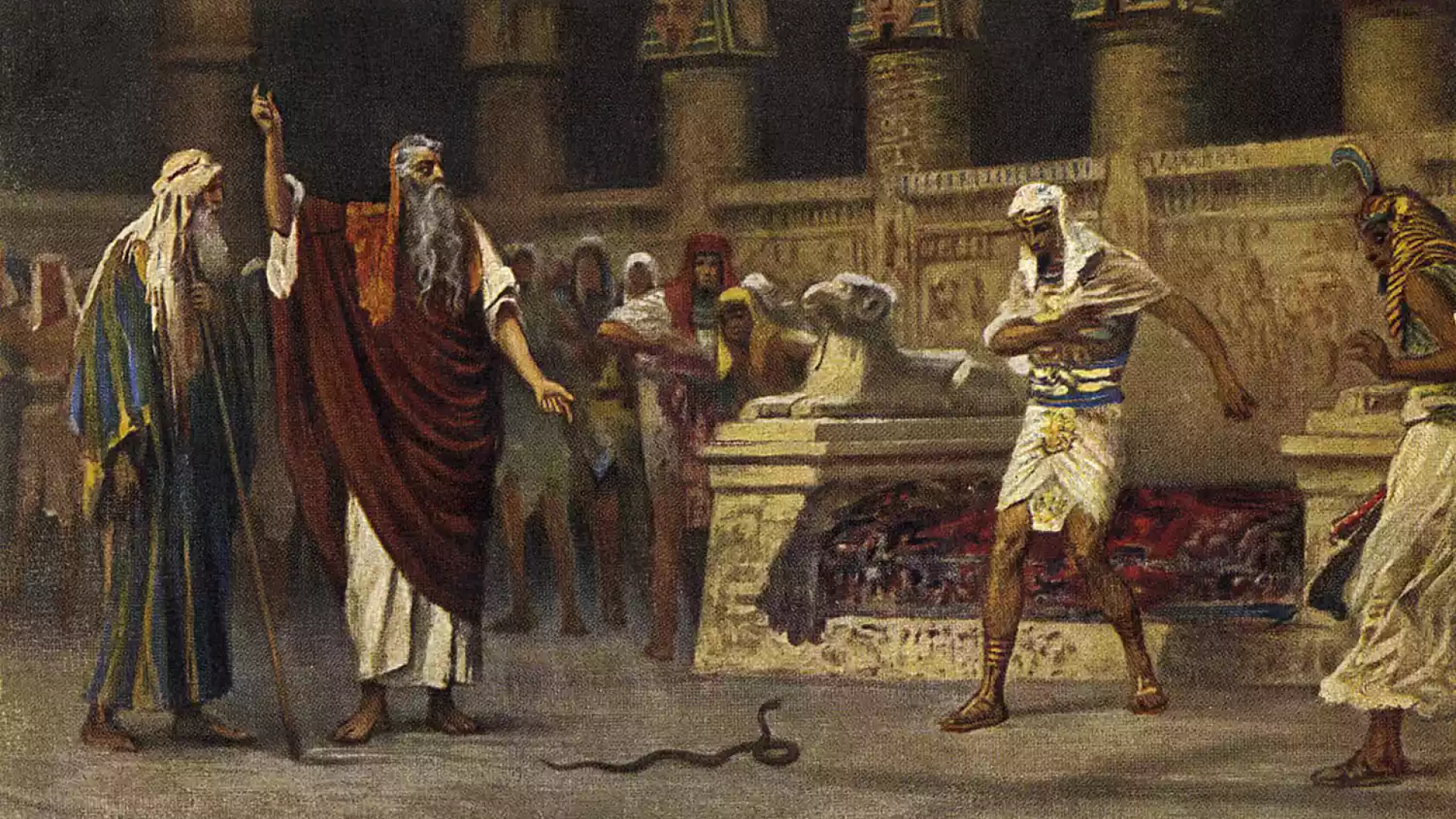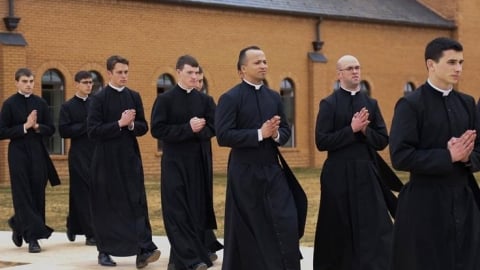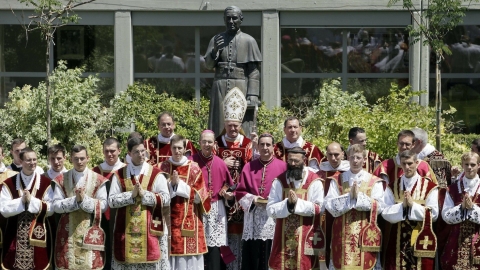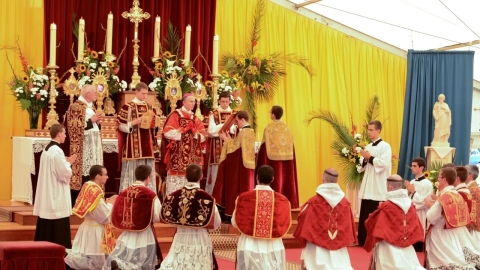Moses, Prototype of Priestly Vocation

Traditionally, the Society of Saint Pius X dedicates the second Sunday after Easter, also known as Good Shepherd Sunday, to preaching, prayers, and seeking support for vocations. This practice is guided by the deep conviction of its Founder, Monsignor Lefebvre, who believed that in order to continue the Church, save souls and Christian society, and revive the principles of Christendom, it is absolutely necessary to have priestly vocations and to form holy priests. The hope is that this conviction of our Founder becomes shared by all the faithful, so that priestly vocations become a commitment for everyone, both priests and the faithful.
To develop this theme, nothing seems better than showcasing a prototype of priestly vocation, where we can observe both the qualities of the candidate and the importance of having many such individuals. Paradoxically, one of the most complete prototypes is found in the Old Testament, namely Moses. Indeed, in him, we see what a vocation entails in its preparation, exercise, and virtues.
1st Moses before the call of God
As is known, Moses was the great leader of the people of Israel, chosen by God to deliver them from the slavery of Egypt. However, his mission was slowly prepared by the Lord.
Scripture tells us that after the death of Joseph, a Pharaoh who did not know Joseph ascended the throne of Egypt. This Pharaoh was alarmed to see a foreign population, the Hebrews, settled among his subjects, which could potentially ally with Egypt's enemies. To prevent the Hebrews from multiplying in the land of Egypt, Pharaoh decrees that every newborn Hebrew boy should be thrown into the Nile.
During this time, Moses is born. A pious mother, in the midst of persecution, does not want to kill her newborn son by throwing him into the Nile as ordered by Pharaoh. Instead, she keeps him at home for three months. Unable to hide him any longer, she abandons him in the Nile in a basket sealed with pitch. Providentially, Pharaoh's daughter finds the child on the banks of the Nile, grows fond of him, and raises him in her father's court. God had destined him to be the liberator of Israel from its painful bondage.
Educated in Pharaoh's court, Moses, at the age of 40, decides to return to his people. St. Paul tells us that Moses made this decision by despising the world and willingly enduring the disgrace of his people's faith. Shortly thereafter, while defending a Hebrew man brutally mistreated by an Egyptian, Moses kills the Egyptian. Learning that Pharaoh is aware of the incident, Moses flees to the land of Midian, where he marries and spends another 40 years of his life as a shepherd. It is during this time that the Lord appears to him in a vision and reveals the mission destined for him.
Here, we can see the first condition in every priestly vocation, which is a contemplative life, a withdrawal from the world, its maxims, spectacles, and vanities. Every young person who bears the name of Catholic should dedicate themselves to a serious life of piety. There are many priestly vocations, and they are necessary at all times. However, today, when they are so needed, it cannot be an exception. The challenge lies in the fact that to hear and recognize this vocation, this call from God, it is necessary to live minimally separated from the world and lead a good spiritual life. Unfortunately, most young people, even in our priories, do not fulfill this duty. Thus, there are many among them who have a vocation, but it may not be recognized or heard, and God will still hold them accountable.
The Lord appears to Moses at the age of 80, on Mount Horeb, with the vision of the burning bush. "I have seen the affliction of my people in Egypt, and I have heard their cry. So now, go: I am sending you to Pharaoh to bring my people, the Israelites, out of Egypt, and I will lead them to a good and spacious land flowing with milk and honey." Moses, initially frightened, cites his personal shortcomings: who is he to appear before Pharaoh? Besides, he stutters; others may fulfill this mission better than him. So, he implores the Lord to send someone else. However, the Lord pays no heed and reveals through clear and miraculous signs that he, and not another, is chosen for this great mission.
A similar pattern often occurs in the vocation to priesthood. It is not uncommon for a young person who feels called by God to be initially frightened by the obligations it entails and, at times, he may try to evade it for worldly reasons: "Lord, send someone else, for I have other responsibilities, other projects, other aspirations." Nothing matters in the face of God's will. Often, the Lord will also condescend to the fears of the candidate and provide assurance through supernatural signs that this is His will.
2nd Moses invested with the divine mission
Moses has been invested by God with a lofty mission: to free the people of Israel from the slavery of Egypt and lead them to the promised land.
However, this mission cannot be compared to the more sublime one of the priest, invested by God with the mission to liberate not just a particular people but the souls of all nations. This mission involves liberating them from the spiritual slavery of sin and leading them to the promised land, a land not of material prosperity but of supernatural and eternal goods.
To accomplish this, God gives Moses the power to perform the ten plagues of Egypt and other miraculous wonders. Moses opens the Red Sea to allow the passage of Israel and later drowns Pharaoh's entire army in it. He opens the heavens to provide mysterious manna, causes water to flow from rocks to quench the thirst of the people in the desert, and protects them through prayer against the Amalekites who attack through ambushes. All of this follows a mysterious rite that God commands through Moses: after each family sacrifices a lamb and uses its blood to mark the doorposts, they must consume it to gain the strength needed for the journey.
Could the mysterious and great powers of the priest be proposed to us in a more beautiful way under these figures? To fulfill his mission of liberating souls from sin and leading them to eternal life, God imparts to the priest the power to strike the devil with all kinds of plagues, destroying his power over souls and forcing him to release those he holds in his clutches. God gives the priest the power to immerse all souls in the waters of baptism, where all their sins are drowned. God grants the power to nourish souls with the manna of the Eucharist, to satiate them with the water of grace, to protect them through prayer against the dangers that threaten them and the divine punishments they sometimes deserve. Above all, the power to immolate, for the benefit of the entire Christian people, the true Lamb of God, to wash souls with His blood and apply to them the fruits of redemption.
3rd Virtues of Moses as a mediator between God and His people.
If we now look at the life of Moses, we will see that he lacked none of the virtues that should characterize the priest of God. Indeed, Sacred Scripture shows us Moses adorned with great zeal for the glory of God, great union with God, with whom he conversed as a friend talks to another friend, and whom he saw face to face. Moses was also adorned with great zeal for the good of his people, advocating for them every time God wanted to punish them for their resistance and sins. He was full of gentleness, prudence, religion, humility, willing to bear with magnanimity the immense burden of ruling such a numerous and stiff-necked people.
In all this, Moses presents himself as a finished prototype of a priestly life. The priest is essentially a mediator between God and men. Therefore, before men, he must be the man of God, completely devoted to His service, invested with His authority, zealous for His glory. However, before God, he must be the intercessor for men, seeking to obtain for them the gifts, benefits, and graces of God, truly being the giver of sacred things ("sacra dans") and the dispenser of sacraments ("sacramenta"). This dual office requires them to be adorned with all virtues.
Conclusion.
As can be seen, through Moses, God wanted to deliver Israel from the harsh slavery of Egypt and establish the great covenant that made them His people. Through him, God wanted to give them the Law, that is, the divine revelation that should be their most precious instruction. Through him, God wanted to sanctify them, judge them, and govern them. Thus, we could not conceive of Israel as a free people and the people of God without the presence of this great mediator.
Similarly, according to God's plans, the Church, that is, the faithful, believing, sanctified people led towards God, could not be conceived without the intervention of the priest, to whom the Lord has entrusted all these ministries. That's why when God wants to punish a people, He leaves them without priests. Therefore, the shortage of priests and holy priests is the problem that should concern us the most and should motivate us to prayer, penance, and action.
- YOUTH: Consider the theme of your vocation, if you have never done so seriously, and be generous if you see that God may be calling you. The salvation of many souls depends on it, and the growth of the faithful people depends on it.
- PARENTS: Cultivate carefully in the souls of your children the atmosphere of Christian life, recollection, piety, and the frequent reception of sacraments, which are the proper atmosphere for the birth of vocations. Love and appreciate this gift in your families if the Lord deigns to grant it. Moreover, earnestly ask God for it.
- EVERYONE: Let us pray to the Lord that today, more than ever, He may have mercy on so many souls without a shepherd, who are therefore heading towards perdition. May He grant to His holy Church priests, holy priests, many holy priests, and many holy religious vocations, for the glory of God, the honor of the Holy Church, and the salvation of many souls.
"Every priest is taken from among men and is appointed on behalf of men in everything pertaining to God, to offer gifts and sacrifices for sins." - Saint Paul to the Hebrews.
Source : Hojitas de Fe | FSSPX





